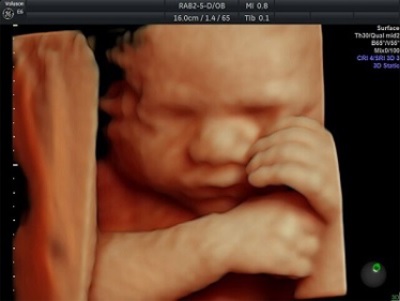The best time for a 4D ultrasound scan is around 27 weeks into your pregnancy. While 4D scans are available from 24 to 32 weeks, we recommend having the scan at 26 – 29 weeks in case your baby is growing slower or faster than average.

Expectant parents often ask us how long they should wait before coming in for a 4D ultrasound scan. Obviously, if the scan is carried out too early, the foetus will not have developed far enough to give a satisfactory image, but waiting until the final weeks of your pregnancy isn't a very good idea either.
Many people believe that they must wait until at least 30 weeks to book an ultrasound session, but this—if you'll pardon the pun—is a misconception. Here at First Encounters Ultrasound, we offer a 4D scan from 24 weeks to 32 weeks; however, we recommend 26 – 29 weeks as the optimum time for a 4D scan, as this allows us to accommodate babies who are developing at a slower or faster rate than average. It would be a shame if you visited our clinic at the start of your 24th week, only to find that your baby isn't quite ready for the camera yet!
So, to answer your question: the best time to have a 4D baby scan is around 27 weeks. However, this does not mean that a satisfactory image cannot be captured later on; every pregnancy is different, of course, but we are almost always able to achieve great results up to 32 weeks.
Upon request, we can also determine the gender of your baby during your 4D scan to make the experience all the more memorable.
Why can't I have a 4D scan after 32 weeks?
As mentioned above, the cut-off point for our 4D scan is 32 weeks. You may be wondering why this is the case; surely the image would be even better if we waited until the baby was completely developed?
The reason is quite simple: there's only a limited amount of space in your womb, and our sonographers are able to achieve better results when there's still some room left in there.
The main aim of a 4D scan is to capture an image of your baby's face, and we can only do that if he or she is facing the camera (or rather the ultrasound probe) when the scan takes place. If, when you arrive at our clinic, your baby is facing your back, he/she will need room to turn around—otherwise, we're stuck looking at the back of baby's head!
As your child grows, they leave less and less room for moving around, which means that the chances of turning become quite slim after the 32-week point. Furthermore, fluid levels reduce as the pregnancy develops, which will further impede the projection of imagery and also your baby's movement within the womb.
Is there any way to encourage movement?
Want to keep your baby moving on the day of your scan? Here are a few suggestions:
- Sugar stimulation is a good way to promote movement in utero. Eating a bar of chocolate and/or having a fizzy drink about 20 minutes before your scan will give your baby a burst of hyperactivity!
- We recommend having a full bladder when you come in for your 4D scan. If your baby's head is pointed downwards, he or she may decide to play hide-and-seek by burying it in your pelvic area. An inflated bladder helps to prevent this from happening, lifting your baby into a better position for the camera.
- If you come in for your scan and your baby is feeling camera-shy, we will recommend that you take a brief walk to get things moving in there.
If all else fails and we are unable to get a good picture of your unborn child, we will be more than happy to offer you a complementary re-scan visit on another date.
Click below to browse our scan packages and book your 4D ultrasound appointment online!
Browse Our Scan Packages >
